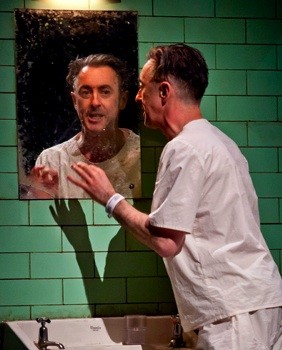Alan Cumming as Macbeth and Everyone Else
Descent into Madness Electrifies at the Barrymore
By: Susan Hall - May 23, 2013
Macbeth
by William Shakespeare (sort of)
Directed by John Tiffany and Andrew Goldberg
Ethel Barrymore Theater
New York, New York
Thru July 14, 2013
Alan Cumming is inarguably an electrifying artist. A man of many parts, he sings, writes, dances, directs, produces. Whatever he touches engages and often elevates.
Shakespeare called his Macbeth the Scottish play, and it seems particularly appropriate that the Scotch actor, magnifying his burr, takes on the play. Cumming portrays all the characters as they whirl from his mind onto the stage.
Some characters emerge more fully from the chaos than others, perhaps because they are dominating the Thane of Cawdor’s thoughts. Lady Macbeth surely pushed Macbeth’s descent into madness, if not just his ambition, which she aroused on her own behalf. When Macbeth and the lady make love, if that’s what you can call the tangle on a hospital bed, onanism is at its height. It must be, since Cummings is both partipants in a single sexual melee.
Scenes with Banquo, or within Banquo, played in a mirror over a sink with a warm but intense yellow light hovering above, were mesmerizing. Cumming speaks about how he remembers who he is portraying: For instance, the good and simple Banquo is always tossing an apple like a juggler’s ball.
But does identity make a difference in this take? Probably not. Because it is always Macbeth even when he calls himself Fred.
In a real sense, in this Macbeth, these are Macbeth’s characters, not Shakespeare’s. Shakespeare provided the story and the language. But Macbeth’s descent into madness is Cumming's own, directed with style and drive by John Tiffany and Andrew Goldberg.
Is this play about mental illness? The buzzing, static sounds of a wild mind on a wild night growl surround Macbeth. The green tile set with imposingly high walls, is an asylum ward, a trap. But this visual enhancement of Macbeth’s state is less about an asylum than a reference and reminder of Macbeth’s descent.
Alan Cumming is brilliant. Twisting, turning in an ever narrowing gyre, he flutters his hands and entwines his body in his memory of the catastrophic power play fanned by his commanding wife. An infinitely maleable face, a body that can easily go from sliver to bound to wrapped, Cumming attracts attention with an ever changing bag of gestures.
Cumming, ever the entertainer, cannot help stepping out from time to time, and winking at the audience, who laugh appreciatively when he delivers Shtick. For me, the tone was destroyed at those moments. After Macduff’s description of the disturbances in nature that took place during the night of Duncan’s murder — the “lamentings heard i’ the air” and “strange screams of death” — Mr. Cumming’s Macbeth says with a shrug, “ ’Twas a rough night.” Laughter. Hearing from one of the murderers he has hired that Banquo lies dead in a ditch, with 20 gashes in his head, Mr. Cumming uses the same offhand tone to reply, “Thanks for that.” More laughter.
The intensity of the evening may require breaking up. This is done in part by visual extensions. Cumming as three witches appears on three screens monitoring the room. The trilogies kept reminding us of the witches, and also of triumvirates of words in the play, “It will have blood, they say blood will have blood" and “Tomorrow and tomorrow and tomorrow.”
Cumming’s Macbeth character, elucidated by recent marvelous performances by Tina Packer, strongly suggest what it would be like to be around Lady Macbeth. Macbeth, in her, out of her and consumed by her, becomes her crazed vehicle. He is driven around the bend by his wife, for he has none of her deep Machiavellian desire.
Cumming’s Macbeth is a tour de force, a thrilling evening of theatre.
Update May 26, 2013. Interview of Cumming on Studio 360.
In an interview on Studio 360, Cumming said that the concept for the role was director Andrew Goldberg’s. Cumming is supposed to play a mad actor who remembers Macbeth as he is confined in an asylum. He wanted to let the audience laugh even when dreadful things were happening. He reports that the role is one which takes unusual physical and emotional stamina.
That was clear to me. Perhaps because I wished for another concept I did not clearly see the original one.



